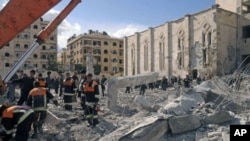The failure of Western and Arab League efforts to persuade the Syrian government to end its violent crackdown against protesters is raising new fears of what lies ahead.
The images out of Syria are frightening.
And so far, President Bashar al-Assad has not taken steps to de-escalate the crisis.
That worries Dr. Gerrold Post at George Washington University. He is director of the school's Political Psychology program and has briefed U.S. presidents on the psyche of world leaders.
“His [Bashar al-Assad] only root seems to be one of force. And that is dangerous and there is no good ending to this other than increasing violence,” said Post.
The foundation of Assad's regime stems from his father, Hafez, who ruled Syria with an iron fist for three decades.
The Assads are from the minority Alawite sect of Shia Muslims. Radwan Ziadeh, director of the Syrian Center for Political and Strategic Studies in Washington, said the regime’s primary function is Alawite control of the country.
“The regime depends on the security apparatus in Syria, which is heavily controlled by the Alawites. And this creates such a kind of network among the Alawite officers and security officers to be actually loyal to themselves,” said Ziadeh.
Bashar al-Assad was not his father’s first choice to succeed him. Trained as an optomologist in London, he was considered too timid. His father favored his more aggressive older brother Basil, who was killed in a car accident. After his brother's death, Bashar was summoned back to Damascus to be schooled as Syria’s future leader.
“And the degree to which the extent of violence that he is conducting is to say to his father’s inner circle and the military leaders, 'I can do this just as well as my father. I can live up to his image,'” said Post.
Watch related video of VOA's JulieAnn McKellogg's interview with Syrian activist in Homs
In 1982, Hafez al-Assad crushed a rebellion in the city of Hama. Amnesty International puts the death toll at between 10,000 and 25,000. Post said that left an impression on Bashar al-Assad.
“One of the complicating issues for him is there really is no model for reconciliation… how to handle conflict other than the model provided with the so-called Hama rules in 1982,” said Post.
Some analysts believe Assad is not fully in control of the current crisis. They say his advisers, some from his father’s time, counsel against compromise.
“This is why we see when the uprising started it is very difficult for Bashar Assad to do any concessions or meaningful reforms. Because they know that any step they do, that the whole regime will collapse,” said Ziadeh.
The result is an increasing level of violence and a civilian population increasingly estranged from a nation's leader.
| Join the conversation on our social journalism site - Middle East Voices. Follow our Middle East reports on Twitter and discuss them on our Facebook page. |















